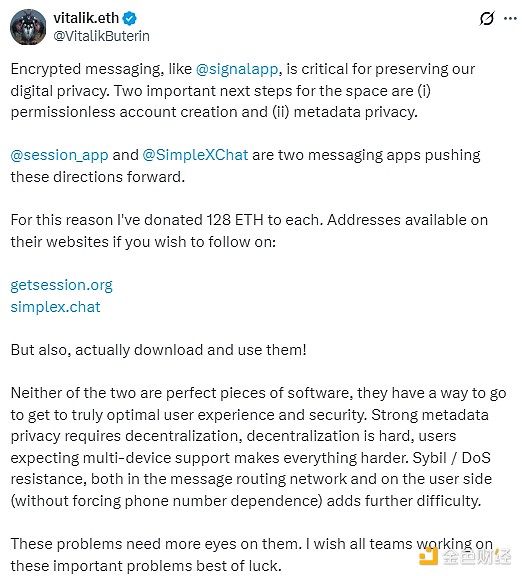What are the backgrounds of the two applications supported by Vitalik? Is private communication the next big trend?
Deng Tong, Jinse Finance
On November 27, 2025, Vitalik posted on X, strongly supporting two decentralized messaging applications, Session and SimpleX Chat, and donated 128 ETH to each of them.
Vitalik pointed out: Digital privacy protection in encrypted messaging is crucial. The next two important development directions in this field are: (i) permissionless account creation; (ii) metadata privacy protection.
Neither of these two pieces of software is perfect; they still have a long way to go to truly achieve optimal user experience and security. Strong metadata privacy protection requires decentralization, which is itself difficult to achieve, and users’ expectations for multi-device support make things even more challenging. Defending against Sybil attacks/denial-of-service attacks in the message routing network and on the user side (without mandatory reliance on phone numbers) also adds to the difficulty. These issues require more attention. Best wishes to all teams dedicated to solving these important problems.

I. What are Session and SimpleX Chat?
1. Session
Session development began in 2018, initiated by the Australia-based Oxen Privacy Tech Foundation. The project was originally a fork of another instant messaging software, Signal, aiming to expand upon it. However, due to concerns about the centralized structure of the Signal protocol and potential metadata collection issues, the team decided to take a different path and created their own protocol, the "Session Protocol." This approach prioritized enhanced anonymity and decentralization. During development, the team encountered various challenges, leading to many features being abandoned or modified. In 2024, facing increasingly strict privacy and surveillance legislation in Australia, the Session Technology Foundation was established in Switzerland to take over the development and release of the application.
Session is a decentralized "end-to-end encrypted instant messaging tool" designed to "minimize metadata leakage"—metadata refers to information surrounding the content, such as IP addresses or sending times. Session allows users to create accounts without a phone number or email address. It uses a randomly generated 66-character alphanumeric string for user identification. Communication between users, including messages, voice clips, photos, and files, is all end-to-end encrypted using the Session protocol. Session uses the Loki blockchain network for transmission. In 2021, an independent review by third-party agency Quarkslab confirmed these claims. In 2025, Session announced its migration to its own Session Network—a decentralized, open-source blockchain network designed specifically for transmitting encrypted data for the Session instant messaging software.
Session has also issued the SESH token. According to CoinGecko data, the token surged to a high of nearly $0.3 due to Vitalik's X post, but has since fallen back to $0.1961 at the time of writing.

2. SimpleX Chat
SimpleX Chat is also an open-source instant messaging tool, featuring "no user identifiers"—no phone numbers, no emails, and not even random usernames/IDs. It supports end-to-end encryption (E2EE), and its protocol is designed with future quantum computing resistance in mind.
According to the SimpleX Chat official whitepaper: The SimpleX Messaging Protocol (SMP) is a protocol for one-way message sending that relies on intermediary servers. Messages are delivered through one-way queues created by the recipient. The SMP protocol allows SMP servers to act as proxies, using "private routing" to send messages, protecting the sender's transmission information (IP address and session) from being exposed to servers chosen (and possibly controlled) by the recipient.
SMP runs on top of a transport protocol that provides integrity, server authentication, confidentiality, and transport channel binding. SimpleX servers are one such example. The SimpleX network refers to the collection of SimpleX servers supporting SMP. The SimpleX client library communicates with SimpleX servers via SMP and provides a low-level API not typically used by applications. SimpleX Agents interact with SimpleX Clients, providing a higher-level API for application use. They are usually embedded as libraries but can also be abstracted as local services. SimpleX agents communicate with each other via end-to-end encrypted envelopes provided by the SMP protocol—the syntax and semantics of messages exchanged between agents are defined by the SMP agent protocol.
Next year, SimpleX will launch "vouchers," which users will need to purchase and donate to the community (such as the Bitcoin community) to host the required servers.
II. Behind Vitalik’s Endorsement: Protecting Privacy in Instant Messaging Is Becoming a Necessity
Under the influence of measures such as the EU's previously proposed "chat control," privacy issues in instant messaging applications have been a hot topic. This measure would require platforms like Telegram, WhatsApp, and Signal to allow authorities to review messages before they are encrypted and sent.
The reason Session and SimpleX Chat have gained Vitalik's favor lies in their precise alignment with the two core directions he proposed: "permissionless account creation" and "metadata privacy protection." Permissionless account creation means users do not need to provide any personal identity credentials, completely breaking the identity-binding shackles of traditional communication tools and avoiding the chain risks caused by identity information leaks; metadata privacy protection goes beyond simple content encryption, extending the protection scope to metadata such as message sending time, sender IP address, recipient address, message size, etc.—these pieces of information may seem trivial, but through big data analysis, one can outline users' social relationships, behavioral habits, and even asset status. Their privacy value is no less than that of the communication content itself.
As early as April this year, Vitalik proposed a roadmap aimed at making it easier and more natural for ordinary users to conduct private transactions and anonymous on-chain interactions, without major changes to the network’s core protocol. The proposed roadmap covers four main forms of privacy: privacy for on-chain payments, partial anonymization of on-chain activity within applications, privacy for on-chain reads, and network-level anonymization.
Subsequently, Ethereum has continued to move in the direction of increasingly emphasizing "privacy": at the Ethereum Developer Conference from November 17 to 22, Vitalik released the Ethereum privacy protection encryption tool Kohaku—a new privacy and security toolkit for Ethereum wallets.
On November 25, while JPMorgan, Citigroup, and Morgan Stanley, among other Wall Street banks, were still grappling with the aftermath of massive data breaches, Vitalik delivered a crucial message: "Privacy is not a feature; privacy is basic hygiene."
Alexander Linton, Chairman of the Session Technology Foundation, pointed out: "Unfortunately, current regulatory and technological developments are threatening the future of private instant messaging. However, the challenges faced by private instant messaging are solvable, and I believe Vitalik is well aware of the importance of decentralization in this struggle. Due to regulatory measures such as chat control, everyone working in private communications is currently facing some kind of threat, but this support helps us focus on our mission."
Session co-founder Chris McCabe noted: "It's amazing that we can clearly see that Vitalik and many people around the world understand what true privacy is and what people need to live freely." Raising global awareness of encrypted, decentralized messaging should be the next important step. "If we are to send a message to the world, it is that you do not have to be a commodity; you can be whoever you want to be and express yourself freely. Privacy is a right; you just need to know it exists."
Zac Williamson, co-founder of the privacy-focused Ethereum Layer 2 network Aztec Network, pointed out: "People's lives are increasingly dependent on digital spaces. These spaces are extremely vulnerable to surveillance that is unparalleled in the real world. Privacy is crucial; it allows people to act freely in online interactions, rather than becoming digital commodities whose data is collected, sold to the highest bidder, and used to harm users' interests."
III. Conclusion: Is the Next Trend the "Privacy" Track?
For ordinary users, Session and SimpleX Chat provide a brand new privacy communication option, especially in protecting sensitive information, and their future value has already begun to emerge; for the crypto industry, these two "explorers" offer more ideas for the comprehensive development of Web3 privacy infrastructure.
Although the privacy communication track is currently far less grand in narrative than AI, DeFi, and other tracks, the attention from Vitalik and the Ethereum team may attract more projects and capital to enter the field. Amid intensified global regulation and continuous data breach scandals, with more developers joining, decentralized privacy communication may well become the next industry trend.
Disclaimer: The content of this article solely reflects the author's opinion and does not represent the platform in any capacity. This article is not intended to serve as a reference for making investment decisions.
You may also like
Bitcoin set for ‘promising new year’ as it faces worst November in 7 years

From "whoever pays gets it" to "only the right people get it": The next generation of Launchpads needs a reshuffle
The next-generation Launchpad may help address the issue of community activation in the cryptocurrency sector, a problem that airdrops have consistently failed to solve.

After bitcoin returns to $90,000, is Christmas or a Christmas crash coming next?
This Thanksgiving, we are grateful for bitcoin returning to $90,000.
